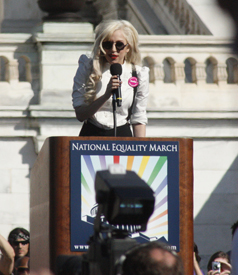Honest, paywall-free news is rare. Please support our boldly independent journalism with a donation of any size.
The people have already decided on gays in the military; it’s time Congress got the message.
Yesterday marked a sad chapter in America’s struggle against discrimination when the Senate blocked a measure to repeal the infamous ‘Don’t ask, Don’t tell’ policy. Under this bizarre law, gays in the military face expulsion if they dare to reveal their sexuality. A gay soldier cannot speak about his marriage, relationships, or indicate his sexual identity in any way — a program reminiscent of bygone days when being left-handed was considered a mark of the devil, and south-pawed schoolchildren were forced to pretend that they were right-handed. Or else.
The Republican stalling was shameful, but predictable. What was worse was the fact that the Democrats, who have been criticizing the law ever since it was enacted under Clinton, couldn’t muster the 60 votes required to end a Republican filibuster. Democrats Blanche Lincoln and Mark Pryor of Arkansas declined to get on board with the repeal, so it fizzled. The struggle isn’t over, but it is now less likely that Congress will revisit the issue in a lame-duck session after midterm madness.
Busy schedule? Click here to keep up with Truthout with free email updates.
It’s time to ask why this discriminatory policy is allowed to continue. And to tell our politicians that Americans have moved ahead of them.
Note to Congress: Across the spectrum of age, religion, and political identification, a striking shift has been taking place in America for some time now. Back in May, Gallop released a poll showing that acceptance of gay relations has now crossed the symbolic 50% threshold. The numbers have been steadily climbing since 2006 – especially among young men (i.e., those who make up the majority of soldiers). There has even been a 16-point jump in acceptance among Catholics. And a whopping 70% majority of Americans continue to favor allowing openly gay men and women to serve in the military, with continued majority support from every key demographic subgroup, including conservatives.
So why did the administration punt on this issue? What happened to the President’s campaign vow to end this retrograde policy? Why does it seem that bankers are the only folks who get top priority in Washington? What are we waiting for?
Actually, Republicans who cling to the notion that anything but heterosexuality is inimical to military service are waiting for a Pentagon study on how repealing the ban might affect troop readiness and morale. The study will be unveiled to President Obama and senior military officials on Dec. 1. So let’s ask another question: Why does it require expensive research to understand that gays and bisexuals have been engaging in illustrious military service since the beginning of recorded history? I’m talking about Achilles here. Alexander the Great. Julius Caesar. Richard the Lionhearted. Lawrence of Arabia. Did these emblems of military prowess make things “uncomfortable in the barracks” – as Bill O’Reilly so delicately put it? Well, perhaps among the enemies they routed. The fact is that crack soldiers have been tall, short, black, white, male, female, straight and gay. Some have even been left-handed. The same folks worried about gays once warned that women harm the military. Now women die for their country, too, with no evil effects on morale. They said roughly same about blacks. We don’t ask for studies of their effects on “troop readiness”. Enough already.
While members of Congress were suffering historical amnesia, pop singer Lady Gaga – dubbed a “sexual radical” by anti-gay activists — released a video urging senators and fellow Americans to push for repeal. Then she betook herself to Maine to speak at a rally to discuss such radical concepts as equality under the law as a Constitutional right. Unfortunately neither Senator Susan Collins nor Senator Olympia Snow – the two Republican Maine senators targeted by Gaga’s Monday visit to Portland – seemed to hear her message. Sen. Lindsey Graham (R., S.C.) heard it, but expressed his disdain: “Whether Lady Gaga likes it or not is not of great concern to me” because she’s not in the military. The Senator’s understanding of the issue of closeted gays in the armed forces aside, he is, undisputably, a politician. And that, alas, would be the American group last to get it on Don’t Ask, Don’t Tell.
The struggle for gay rights follows a similar pattern to that of civil rights, labor rights, and women’s equality. The people have already decided; it’s time Congress got the message.
Lynn Parramore is the editor of New Deal 2.0, Media Fellow at the Roosevelt Institute and the author of Reading the Sphinx.
Trump is silencing political dissent. We appeal for your support.
Progressive nonprofits are the latest target caught in Trump’s crosshairs. With the aim of eliminating political opposition, Trump and his sycophants are working to curb government funding, constrain private foundations, and even cut tax-exempt status from organizations he dislikes.
We’re concerned, because Truthout is not immune to such bad-faith attacks.
We can only resist Trump’s attacks by cultivating a strong base of support. The right-wing mediasphere is funded comfortably by billionaire owners and venture capitalist philanthropists. At Truthout, we have you.
Truthout has launched a fundraiser to raise $50,000 in the next 9 days. Please take a meaningful action in the fight against authoritarianism: make a one-time or monthly donation to Truthout. If you have the means, please dig deep.
